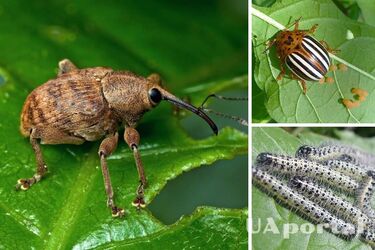Rating of the most dangerous garden pests and methods of controlling them

Plants in the garden are threatened by many pests that can easily cause significant damage to crops and flowers in a matter of weeks. The most voracious are caterpillars, beetles, and small, barely visible insects. And also the larvae of pests that eat away at the roots of plants.
Beetles usually harm the leaves of plants, and some species also eat flowers (for example, the mossy deer).
See also: Shield bug, or "stink bug": how to protect berries in the garden from the pest
Garden bugs like plants belonging to the nightshade family, in particular, potatoes, tomatoes, eggplants, and peppers.
Butterfly caterpillars eat the leaves and shoots of plants, as well as fruits such as cabbage, cucumbers, zucchini, etc.
Leaf-eating pests attack lettuce, spinach, and cabbage.
Aphids (or aphids) - usually appear in early summer and can harm plants by feeding on their sap.
Scales are more dangerous for trees, shrubs, and ornamental plants.
May beetles are doubly dangerous. The beetles themselves eat stems and leaves, but their larvae gnaw out the roots. May beetles usually eat the leaves of apples, pears, cherries, and other fruit trees.
The Colorado potato beetle is a threat to potatoes, eggplants, and peppers.
Bear beetles (common broomrape, or cabbage beetle) - these pests can damage the root system of plants, including root crops such as potatoes, carrots, and beets.
Slugs and snails - these pests live on the ground, but they can cause significant damage to plants, in particular, by damaging leaves and stems.
Read also: Not garden orderlies, but Pests: why ants need to be Eliminated
There are several ways to help prevent the spread of pests in your garden and vegetable garden and keep your plants healthy and your crops in good shape.
Use plant material that does not contain pest larvae for planting. If you buy new plants for your garden or vegetable garden, make sure they are not infested and treat them with a weak solution of potassium permanganate before planting them with other plants.
Plant plants at an appropriate distance from each other. Pests usually spread from one plant to another. This will help prevent pests from spreading to all the plants in your garden.
Maintain plant hygiene. Remove dry leaves and old shoots that could be a source of infestation for your garden or vegetable garden. It is also important to periodically weed the beds and huddle the plants.
Use mulch. Mulching is an effective way to prevent weeds from growing and to retain moisture in the soil. Mulch also helps to prevent the spread of pests, as it reduces the risk of pests being transferred to plants. There are also many different pest control products on the market that can help keep your plants from being damaged and destroying your crop. Here are some of them:
Insecticides. These are products that are designed to kill insects that do not harm plants. Insecticides can also be of natural origin.
Fungicides. These are drugs that are designed to protect plants from fungal diseases.
Repellents. These are products that repel pests from plants. They can be of chemical or natural origin. Repellents usually do not kill pests, but simply repel them.
See also: The main thing is to destroy it in time: how to deal with the boroznyak in the garden
Natural preparations. There are many natural preparations that can help protect your plants from damage and crop destruction. For example, using essential oils or garlic oil.
An infusion of potassium permanganate can help reduce the number of pests in your garden or vegetable garden.
Using garlic and pepper. Garlic and pepper can be added to wormwood or dandelion decoctions to increase their "repellent properties". You can also stick cloves of garlic and peppercorns in the ground in the garden to repel insects.
Use baking soda and liquid soap. A solution of baking soda and soap can help reduce the number of pests on plants. To prepare the solution, mix one-part baking soda with one part liquid soap and dilute them in 4-5 liters of water. Then treat the stems and leaves of the plants.
See also: They can eat the whole crop: how to get rid of May beetle larvae effectively and easily
Use of herbal infusions. Some herbs have repellent properties against insects and other pests. Herbs such as tansy, nasturtium, chamomile, and others can be used to make infusions. To prepare an infusion, you need to pour boiling water over the dried herbs and leave them for several hours. The resulting infusion can be sprayed on plants or watered in the garden.
We also offer to learn about effective slug baits.
If you want to get the latest news about the war and events in Ukraine, subscribe to our Telegram channel!
